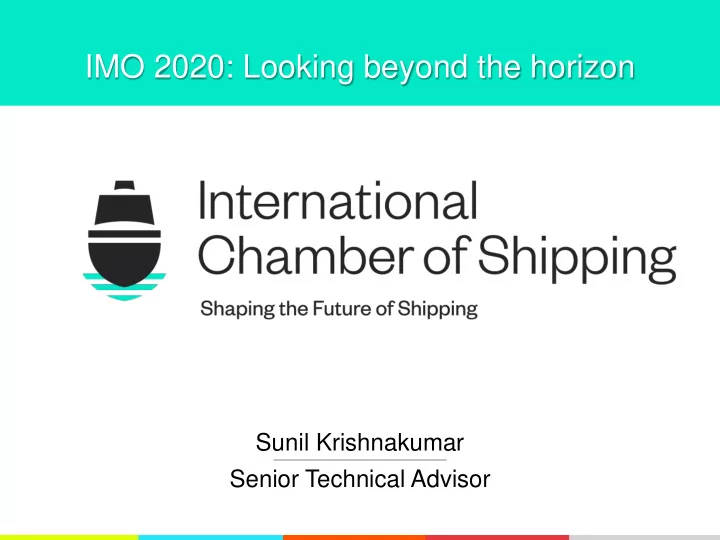

IMO 2020: Looking beyond the horizon Sunil Krishnakumar Senior Technical Advisor
About ICS The global trade association for merchant shipowners and operators formed in 1921 First shipowner NGO granted IMO consultative status (1961) Membership comprises world’s national shipowner associations, representing all sectors and trades and over 80% of world merchant fleet
IMO Work on 2020
ICS Work at IMO Proponents of the concept of carriage ban on non-complaint fuels Vital role in the development of IMO template on ship implementation plans Substantial contribution to the IMO suite of 2020 guidance Proactive participant in discussions related to fuel quality and safety
ICS Work - Guidelines ICS guidance on Preparing for Compliance with the Global Sulphur Cap Joint industry guidance on supply and use of 0.50% fuel Participation in fuel quality and safety initiatives e.g. Amsterdam Rotterdam Antwerp (ARA) fuel quality working group, CIMAC WG7 on fuels etc.
ICS Guidance on Compliance For ships choosing to comply using fuel oils with sulphur content of 0.50% m/m or less Updated to take account of latest IMO decisions Available free of charge via ICS web site
Contribution to external work
Challenges remain Global availability of safe & compliant fuel Consistent and fair verification and enforcement by member States Maintaining level playing field
Availability Positive signs from major bunkering hubs Concerns remain about smaller ports Especially concerning for ships on tramp trades
Safety Incompatibility between different batches of fuels Very little operational experience
Safety Fuel safety a huge concern Fuel supply side still largely unregulated
Verification and enforcement Due consideration to ships that have prepared in advance in good faith Differentiation between accidental and wilful non-compliance Fuel Oil Non Availability Reports
Verification and enforcement ➢ Wilful non-compliance = enforcement action ➢ Ships do not have control over sulphur content of fuel as supplied ➢ Documentation is key - Bunker Delivery Note is a statutory document
Verification and enforcement Sampling for compliance verification ➢ MARPOL delivered sample ➢ In use sample ➢ On board sample
Verification and enforcement MARPOL delivered sample ➢ Previously known as MARPOL Sample ➢ Non- compliance proves supplier’s fault ➢ Should prove which party is responsible for exceedance of the sulphur limit of the ship’s on board and/or in-use fuel oils
Verification and enforcement In use sample ➢ the sample of fuel oil the ship is using at the time of sampling ➢ All ships required to have these points ➢ Location is “ safety critical ” ➢ Non compliant result should be followed up by checking MARPOL delivered sample to confirm responsibility
Verification and enforcement On board sample ➢ The sample of fuel oil intended to be used on board that ship ➢ Set up to address enforcement of carriage ban ➢ Storage tanks are not designed for representative sampling ➢ Non compliant result only applicable for fuel at the point of sampling !
Verification and enforcement Verification standards – MEPC.1/Circ.882
ECA compliance Concentrated Inspection Campaign (CIC) on MARPOL Annex VI by Paris MoU and Tokyo MoU ❖ Number of inspections: 4,304 ❖ Detentions related to CIC topic: 7 ❖ Overall CIC-topic detention rate: 0.2%
Level playing field Carriage ban on non-complaint fuel Similar standards for all methods of compliance Very high premium for non-compliance
EGCS as a compliance option ➢ Grandfathering ➢ ICS list of ports prohibiting discharge from open loop scrubbers ➢ Equivalent standards for equivalent systems ➢ Guidance to members on steps to take following EGCS malfunction – MEPC.1/Circ.883
Conclusions ICS confident that IMO 2020 will be a success Scale of this “regulatory game changer” not to be underestimated Availability of compliant fuel and consistent and fair enforcement will be key
Sunil Krishnakumar Senior Technical Advisor sunil.krishnakumar@ics-shipping.org www.ics-shipping.org @icsshipping
Recommend
More recommend